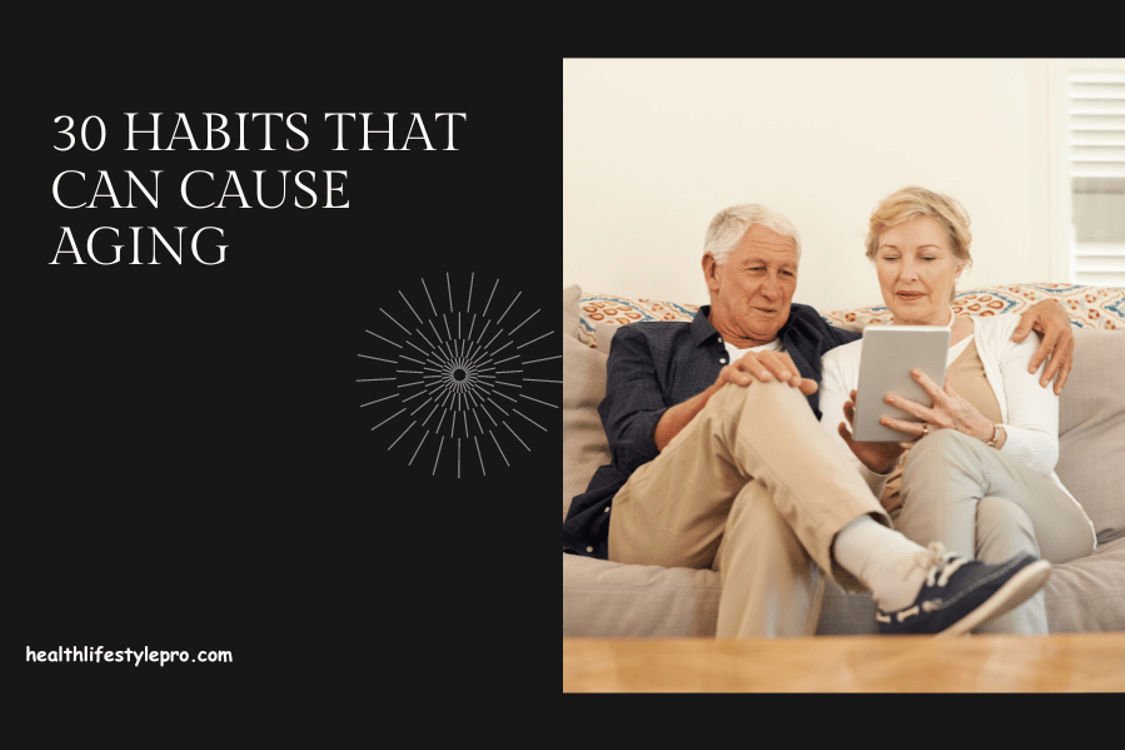Aging is a natural part of life, but that doesn’t mean we can’t strive for healthy longevity. While genetics play a role, many lifestyle habits significantly influence how quickly our bodies show signs of wear and tear. Here, we explore 30 habits that can accelerate aging and offer tips on reversing or mitigating their effects.
Diet and Nutrition

- Skipping Breakfast: Starting your day without breakfast disrupts your metabolism and can lead to overeating later. A balanced breakfast provides sustained energy and essential nutrients for cell repair.
- Sugar Rush: Excessive sugar intake spikes blood sugar, triggering inflammation and damaging collagen, the protein responsible for youthful skin elasticity.
- Processed Food Dependence: Processed foods are often loaded with unhealthy fats, sodium, and refined carbohydrates, all of which contribute to chronic inflammation and weight gain, accelerating aging.
- Essential Nutrient Deficiencies: Lack of vitamins, minerals, and antioxidants hinders cellular repair and weakens the immune system. Focus on a balanced diet rich in fruits, vegetables, and whole grains.
- Crash Dieting: Restrictive diets can lead to yo-yo dieting, which stresses the body and slows metabolism. Aim for sustainable weight management through healthy eating habits.
- Dehydration: Water is crucial for flushing toxins and keeping skin plump. Chronic dehydration can lead to wrinkles and accelerate other aging signs.
Exercise and Movement
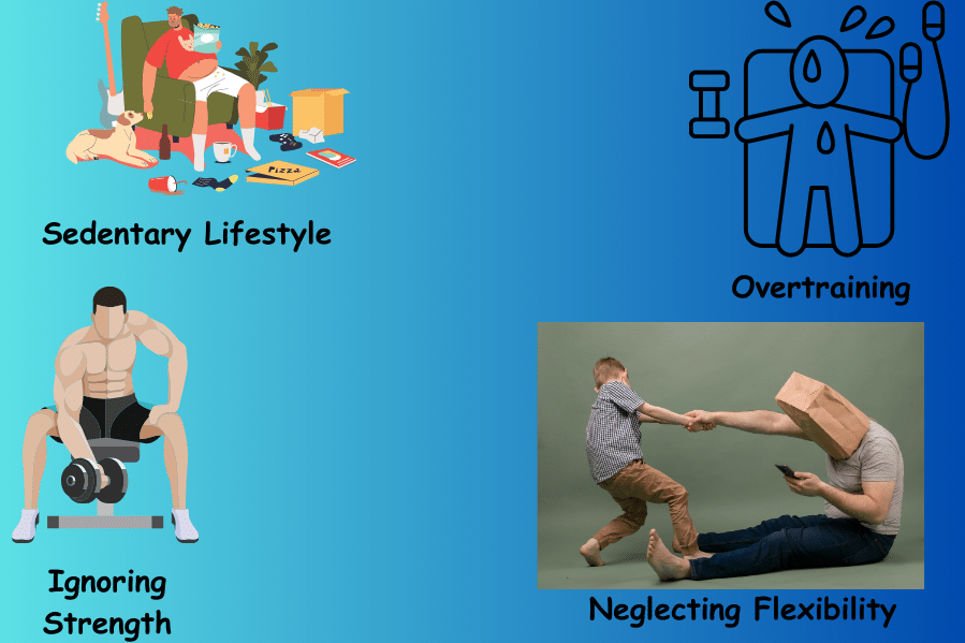
- Sedentary Lifestyle: Lack of physical activity weakens muscles and bones, reduces cardiovascular health, and contributes to weight gain, all of which contribute to a prematurely aged appearance.
- Overtraining: Excessive exercise puts stress on the body, depletes nutrients, and hinders recovery. Aim for a balanced workout routine with rest days for optimal results.
- Ignoring Strength Training: As we age, muscle mass naturally declines. Strength training helps maintain muscle tone and bone density, boosting metabolism and keeping you looking and feeling younger.
- Neglecting Flexibility: Inflexible muscles and joints limit mobility and increase the risk of injury. Regular stretching helps maintain a youthful range of motion.
Sleep and Stress Management
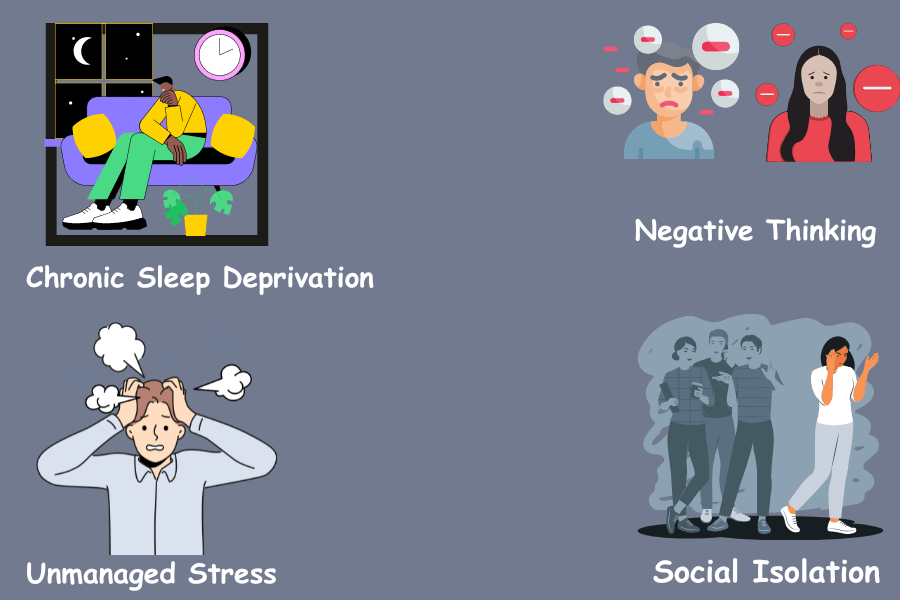
- Chronic Sleep Deprivation: When we don’t get enough sleep, our bodies struggle to repair and rejuvenate. Aim for 7-8 hours of quality sleep nightly for optimal health and a youthful glow.
- Unmanaged Stress: Chronic stress increases cortisol levels, a hormone linked to weight gain, inflammation, and weakened immunity. Practice relaxation techniques like meditation or yoga to combat stress.
- Negative Thinking: Negative emotions and chronic negativity can have a detrimental effect on physical and mental health. Cultivate a positive outlook for overall well-being.
- Social Isolation: Strong social connections contribute to mental well-being and a sense of purpose. Nurture your relationships to stay connected and engaged.
Lifestyle Habits
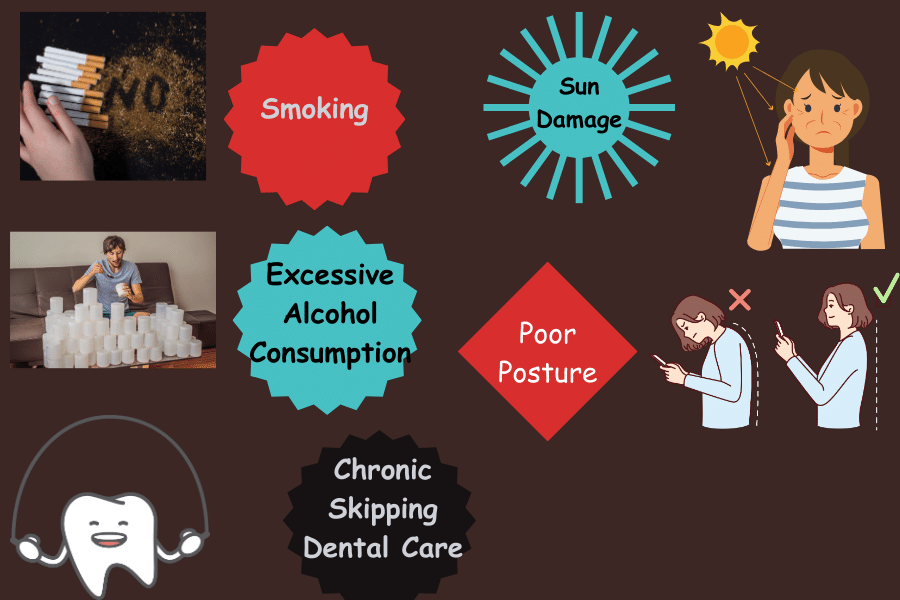
- Smoking: Firstly, Smoking is one of the leading causes of premature aging. As a result, It damages the skin, lungs, and overall health. Quitting smoking offers immediate and long-term benefits.
- Excessive Alcohol Consumption: Overindulging in alcohol dehydrates the body, depletes essential nutrients, and damages the liver, all of which accelerate aging.
- Sun Damage: Ultraviolet rays from the sun are the primary cause of wrinkles, age spots, and an increased risk of skin cancer. Protect your skin with sunscreen daily and avoid peak sun hours.
- Poor Posture: Slouching can compress your organs, lead to back pain, and make you look older. Practice good posture to maintain a youthful silhouette.
- Chronic Skipping Dental Care: Poor dental hygiene contributes to gum disease, which can affect overall health. Regular dental checkups and proper oral hygiene are crucial.
Daily Habits
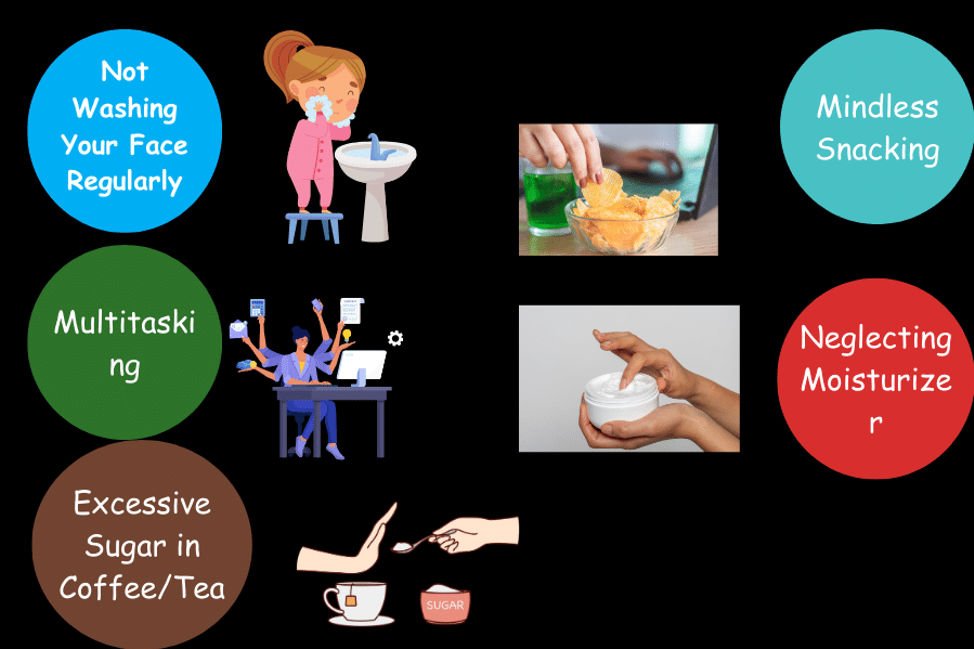
- Not Washing Your Face Regularly: Cleansing your face removes dirt, oil, and dead skin cells, which can clog pores and accelerate wrinkles. Wash your face twice daily for a refreshed and youthful appearance.
- Neglecting Moisturizer: As we age, our skin loses moisture. Use a moisturizer daily to keep skin hydrated and plump.
- Excessive Sugar in Coffee/Tea: Adding excessive sugar to your beverages negates the health benefits and contributes to sugar overload.
- Mindless Snacking: Uncontrolled snacking can lead to unwanted weight gain. Snack on healthy options like fruits, nuts, or yogurt to avoid calorie overload.
- Multitasking: This can lead to stress and decreased productivity.Thus, Practice focused work in short bursts for improved efficiency and reduced stress.
Environmental Toxins
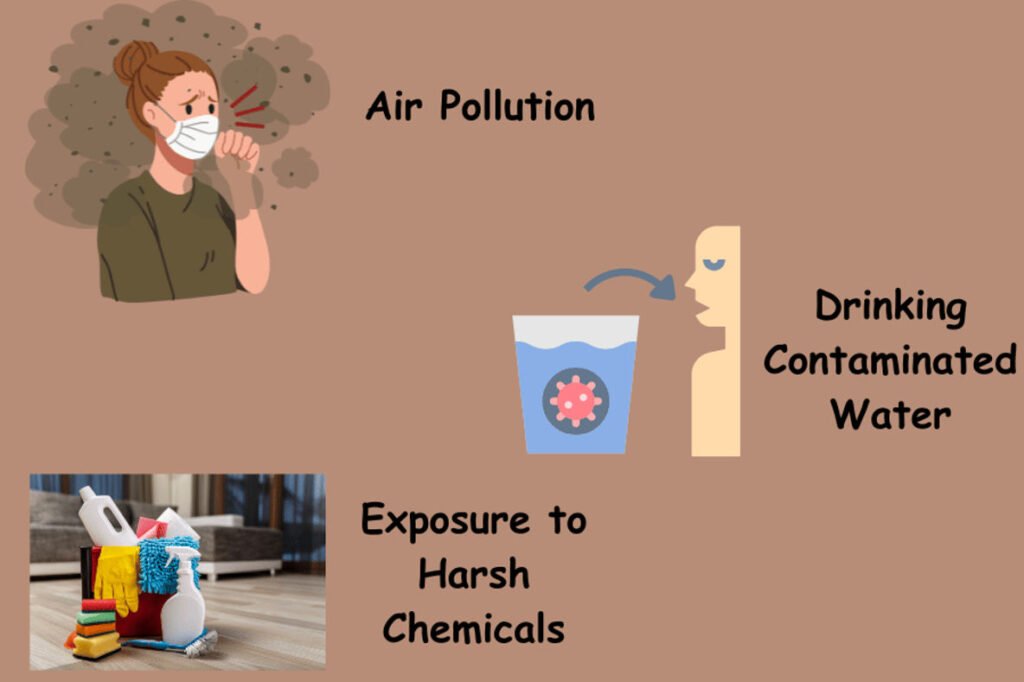
- Air Pollution: Exposure to air pollution can damage skin and exacerbate respiratory problems. Minimize your exposure to pollutants whenever possible.
Exposure to Harsh Chemicals
- Many cleaning products and personal care items contain harsh chemicals that can irritate the skin and potentially contribute to health problems. Look for natural or organic alternatives.
- Drinking Contaminated Water: Lastly, Contaminated water can introduce harmful toxins into your body. Invest in a good water filter or opt for bottled water from a reputable source.
Sleep Disruptions
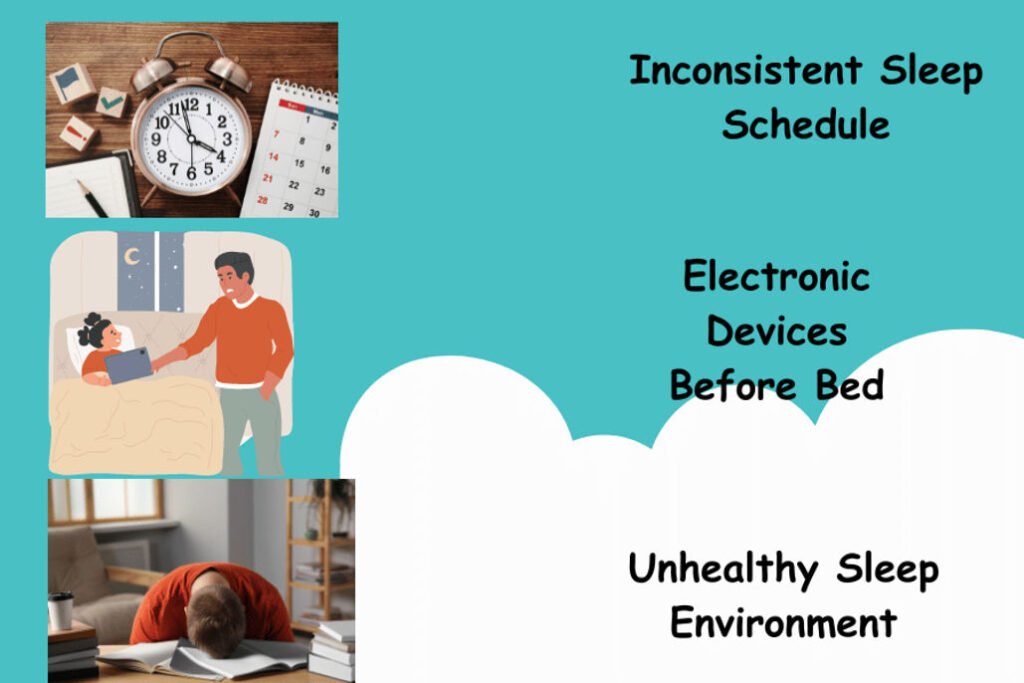
- Inconsistent Sleep Schedule: Going to bed and waking up at irregular times disrupts your body’s natural sleep-wake cycle, leading to fatigue and potential health problems. Aim for a consistent sleep schedule for optimal rest.
- Electronic Devices Before Bed: The blue light emitted by electronic devices can interfere with sleep. Avoid using electronics for at least an hour before bedtime to ensure a good night’s sleep.
- Unhealthy Sleep Environment: An uncomfortable mattress, excessive noise, or a room that’s too hot or cold can disrupt sleep. Invest in a comfortable sleep environment for a restful night.
Remember: Aging is inevitable, but these habits can significantly accelerate the process. By making conscious lifestyle changes and adopting healthy habits, you can promote longevity, enhance your well-being, and feel younger for longer.
| Additional Tips |
- Regular Checkups: Schedule regular checkups with your doctor to monitor your health and address any potential issues early on.
- Stay Hydrated: Drinking plenty of water throughout the day keeps your body functioning optimally and promotes healthy skin.
- Learn and Grow: Continuously learning new things keeps your mind sharp and engaged, contributing to a youthful mindset.
- Support System: Having a strong support system of friends and family can provide emotional support and contribute to overall well-being.
FAQs
What habits age you the most?
Of the habits listed, the ones that age you the most are:
- Smoking: This is a well-known culprit for its damaging effects on the lungs and skin. It reduces blood flow, which can lead to premature wrinkles and a sallow complexion.
- Sun Damage: Chronic unprotected sun exposure is the primary cause of wrinkles, age spots, and an increased risk of skin cancer.
- Chronic Sleep Deprivation: When you don’t get enough sleep, your body struggles to repair and rejuvenate itself. This can lead to a weakened immune system, weight gain, and a prematurely aged appearance.
- Poor Diet: A diet high in processed foods, sugar, and unhealthy fats contributes to inflammation, weight gain, and nutrient deficiencies, all of which accelerate aging.
- Chronic Stress: Unmanaged stress increases cortisol levels, a hormone linked to weight gain, inflammation, and weakened immunity. Chronic stress can also lead to poor sleep habits, further accelerating aging.
These habits have a significant negative impact on multiple aspects of your health, leading to a faster visible aging process.
What speeds up aging the most?
While there isn’t a single factor that speeds up aging the most, two major contributors tend to be at the top of the list:
- Chronic inflammation: This low-grade, long-term body-wide inflammation is linked to various age-related diseases and a faster aging process. Factors like poor diet (high in processed foods, sugar, and unhealthy fats), smoking, chronic stress, and even excessive sun exposure can contribute to chronic inflammation.
- Cellular damage: Our cells naturally accumulate damage over time, and this is a key factor in aging. Habits that accelerate this damage, like smoking, excessive sun exposure, and exposure to toxins, can significantly speed up aging.
These two factors often work together. For example, chronic inflammation can damage cellular components, and cellular damage can trigger inflammatory responses.
Why do some people age quickly?
Several factors contribute to why some people seem to age quicker than others. Here’s a breakdown of the key influences:
Genetics:
- Inheritance: While not the sole determinant, your genes play a role in your aging rate. Having parents or close relatives who lived long lives can indicate a predisposition for longevity.
- Telomere Length: Telomeres are the protective caps on chromosomes that shorten with each cell division. Inheriting shorter telomeres or experiencing rapid telomere shortening can be linked to faster aging.
Lifestyle Choices:
- Diet: A diet high in processed foods, sugar, and unhealthy fats contributes to inflammation, weight gain, and nutrient deficiencies, all of which accelerate aging. Conversely, a diet rich in fruits, vegetables, whole grains, and healthy fats promotes longevity.
- Exercise: Regular physical activity, including strength training and flexibility exercises, helps maintain muscle mass, bone density, cardiovascular health, and overall well-being, contributing to a slower aging process.
- Sleep: Chronic sleep deprivation disrupts cellular repair and weakens the immune system, leading to faster visible signs of aging. Aim for 7-8 hours of quality sleep nightly.
- Stress Management: Unmanaged stress elevates cortisol levels, which can accelerate aging. Techniques like meditation and yoga can help combat stress.
Environmental factors:
- Sun exposure: Chronic unprotected sun exposure damages skin cells, leading to wrinkles, age spots, and an increased risk of skin cancer.
- Toxins: Exposure to environmental toxins like air pollution, harsh chemicals, and contaminated water can damage cells and accelerate aging.
Socioeconomic factors:
- Access to healthcare: Regular checkups and early intervention for health issues can significantly impact your overall health and potentially slow aging.
- Socioeconomic status: Factors like poverty, lack of access to healthy food options, and higher stress levels can contribute to faster aging.
It’s important to remember that these factors often interact with each other. For instance, poor diet can worsen the effects of chronic inflammation, and chronic stress can disrupt sleep patterns.
By adopting healthy lifestyle habits, managing stress, and prioritizing preventive healthcare, you can significantly influence your aging process and promote a longer, healthier life.
Does overeating age you?
Overeating itself doesn’t directly cause aging, but it can contribute to several factors that do accelerate the aging process. Here’s how:
Increased Inflammation:
When you overeat, especially foods high in processed ingredients, sugar, and unhealthy fats, it can trigger chronic low-grade inflammation in the body. This inflammation is linked to various age-related diseases and a faster aging process.
Weight Gain
Overeating often leads to weight gain, and excess body fat, particularly visceral fat around organs, is associated with increased inflammation and a higher risk of chronic diseases like diabetes and heart disease, all of which can contribute to a faster aging process.
Nutrient Deficiencies
Overeating unhealthy foods often displaces nutrient-rich options in your diet. This can lead to deficiencies in essential vitamins, minerals, and antioxidants that are crucial for cellular repair and overall health. These deficiencies can contribute to a prematurely aged appearance and weakened immunity.
Hormonal Imbalances
Overeating can disrupt hormonal balance, particularly insulin levels. Chronically high insulin levels can have detrimental effects on metabolism and cellular function, potentially accelerating aging.
Stress on Organs
Overeating puts a strain on your digestive system, liver, and kidneys as they work harder to process the excess food. This chronic stress can take a toll on your overall health and potentially contribute to a faster aging process.
Reduced Mobility
Significant weight gain due to overeating can limit mobility and increase the risk of injuries. This can lead to a more sedentary lifestyle, which further contributes to health problems associated with aging.
Reduced Sleep Quality
Overeating, especially close to bedtime, can disrupt sleep patterns. Poor sleep quality hinders cellular repair and weakens the immune system, both of which accelerate aging.
Psychological Impact
Overeating can lead to feelings of guilt and shame, contributing to stress and a negative self-image. This can affect mental well-being, which is also important for healthy aging.
The Bottom Line
While overeating isn’t the sole factor in aging, it can significantly influence the speed at which your body shows signs of wear and tear. Focusing on a balanced diet, portion control, and mindful eating habits is crucial for promoting longevity and healthy aging.

I’m a seasoned content creator with 6+ years of experience crafting engaging, SEO-optimized content that drives traffic and rankings. I excel in keyword research, link building, and guest posting, ensuring your brand reaches new heights.

